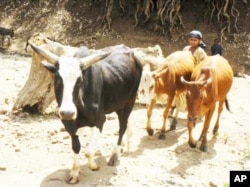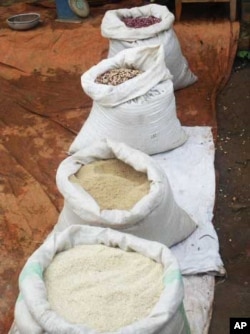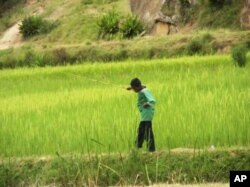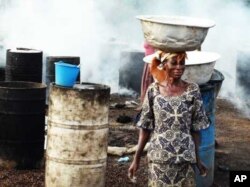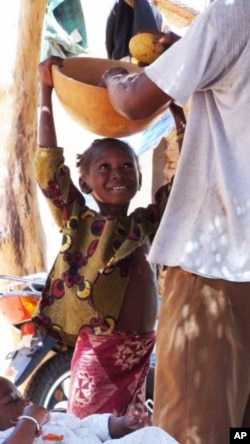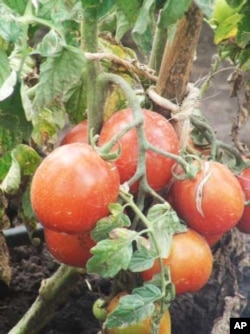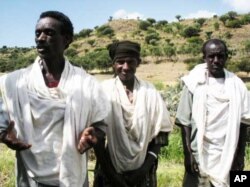This is Part 4 of a 5-part series: Innovations in African Farming
Continue to Part: 1 / 2 / 3 /4 /5
Production of local kinds of crops and breeds of animals is severely threatened in Africa, says Serena Milano, a food biodiversity expert at Slow Food International.
The Rome-based NGO is fighting a global battle to save local food traditions and to get people to develop healthier eating habits. Food produced locally is better than food brought in from elsewhere, it says.
“Over the last century over three-quarters of the genetic diversity in crop varieties has been lost. A third of [the world’s native] sheep and pig breeds are extinct or dying out,” said Milano. “The same thing is happening in cheese, wine and meat, and many other foods.”
She explained that in contrast to mass produced food that isn’t indigenous, locally grown crops don’t have to be grown with the use of chemical pesticides, and locally bred stock animals don’t have to be treated with antibiotics to protect them against local diseases.
“Local plant varieties and local breeds of animals have been selected by farmers through the centuries to adapt to specific areas and specific climates,” Milano said. “This adaptation protects them against illness.”
But she added that large-scale industrial agricultural production is “breaking this delicate balance” and the results include “pollution, water conflicts, obesity in the northern hemisphere and hunger in the developing countries.”
Rice loss
As an example of the dangers facing local food types, Milano cited rice in Guinea Bissau. This small country once fed itself and its West African neighbors with surplus rice of “many traditional varieties,” she said.
But now, Milano explained, Guinea Bissau is importing cheap, mass produced rice from Thailand. “The national production [of rice] has declined and a lot of traditional varieties and a lot of traditional techniques have been abandoned,” she said. “This is happening in many African countries, in Senegal too, in Mali too.”
Most African governments, Milano said, are “fixated” on growing export crops to earn foreign currency and are “not interested” in safeguarding local food. Thus, they often ignore the welfare of their people.
“In Ethiopia, for example, the government is giving hundreds of thousands of hectares of land to Saudi Arabia and India. These countries are using the land to grow crops to export food,” she pointed out. “So one of the poorest countries in the world is giving away land and food. African governments are selling fishing licenses to European fleets and so the local fishermen cannot work anymore.”
Milano commented that throughout Africa farmers are rejecting traditional food varieties to grow “foreign” export crops such as cashew nuts and palm oil. To cultivate these in Africa, she said, “widespread use” of chemical fertilizers and pesticides is necessary, thus reducing biodiversity.
“This is a model of agriculture that has a big cost. An economic cost, because farmers are obliged to buy all these expensive things like pesticides. And an environmental cost, because the chemical products destroy the fertility of the soil,” Milano said.
No local food available
These days, she said, it’s extremely rare to find local food on most African supermarket shelves, for several reasons. “Imported products cost less. Secondly, local communities don’t have the resources to transport, package and distribute food. In Africa most people travel by foot or use donkeys or bicycles, so it’s very difficult to distribute food.
Also, there’s often no electricity and therefore no fridges to keep food fresh in Africa. Staple food like corn is often flown thousands of miles into Africa from the United States, Milano said. “People in African cities are now used to imported foods and they are suspicious of local foods,” Milano said. However, she added, local traditional food is “almost always” healthier.
To ease this “crisis,” she said, Slow Food is working with “many schools and children and parents” in Africa “to promote traditional products and recipes and to explain that traditional products are better from a nutritional point of view.”
Milano said her NGO is “creating 1,000 gardens in 20 [African] countries, in schools, in communities. We are working with hundreds of local people to create very special gardens. In these kinds of gardens we will only use local crop varieties. We will not grow with help of any chemicals, but only compost.
Scientific research has revealed that African vegetables are rich in vitamins and natural mineral salts. “For example, fruit from the baobab tree contains more calcium than milk,” said Milano, and African free range beef is some of the best in the world, with the most vitamins and the least fat when compared to beef from other regions.
“Meanwhile poor quality, imported, processed foods [contain high quantities of] salt, fat and sugar and they often are responsible for malnutrition within communities,” she added.
Dogon of Mali and their unique seasonings
In Mali, Milano said, the Dogon people are “specialists” in collecting wild herbs, seeds, flowers and plants. From these, Dogon women produce many unique seasonings, called some.
“They produce seasonings with dried okra – that’s a local vegetable; with baobab leaves; with different varieties of local peppers; with different varieties of local onions,” she explained. In the past, some was a basic ingredient in most Dogon cuisine. But in recent times the people have abandoned their traditional food in favor of cheap and convenient imported stock cubes “full of unhealthy preservatives,” said Milano.
Slow Food has now launched a project to “rediscover” some, to get the Dogon and other Malians to eat healthy foods again, she said.
“We are working with 60 Dogon women to promote their special seasonings. Later this year we will create a small laboratory to package the different seasonings and we will try to sell them all over the country, in all the main cities in Mali,” Milano told VOA.
The Dogon also plan to sell their seasonings at food fairs in Europe, supported by some top European chefs.
Ethiopian coffee to follow example of wine
Milano said increasing numbers of Africans, like the coffee farmers of Ethiopia’s southern highlands, are dedicated to reinvigorating neglected local, traditional produce.
“Ethiopia is the only place in the world where you find wild coffee plants and very high quality coffee,” she said. But the producers of the southern highlands are isolated. They pick the coffee cherries and sell them at very low prices to traders. “This forces them to focus on quantity rather than the quality processing that could allow them get a higher price at market,” Milano explained.
Slow Food has now organized 700 coffee farmers into an association. “We are trying to work with them to improve the quality [of their coffee] and [for them] to sell directly to the roasters in Europe and the US,” she said.
The farmers are learning how to protect their plants, to fertilize them with organic compost, “and process them to retain the qualities savored by coffee drinkers,” said Milano.
Her group trains communities to pick the berries only when ripe and to dry them carefully, using frames made from locally available materials. “These sorts of innovations not only make coffee taste better, they help farmers earn more,” Milano explained, adding that the farmers’ coffee has “a lot of potential.”
Slow Food is developing a system to label their different coffee varieties, in much the same way different types of wines are labeled throughout the world.
Milano said a “new day is dawning” in African agriculture – one that will enable traditional food to take its “rightful place” in the continent’s supermarkets and to compete with, and hopefully replace, imported mass produced ingredients.




